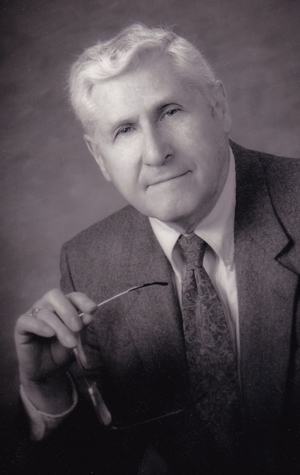Cardiovascular Pioneer William B. Kannel Dies
MED prof’s research led to new understanding of cardiovascular health

William B. Kannel, an emeritus professor of medicine and of public health at the School of Medicine and former director of the Framingham Heart Study, died on August 20. He was 87 years old. A cardiovascular epidemiologist, Kannel began work with the Framingham Heart Study in 1951 and served as director from 1966 to 1979. The multigenerational epidemiological study, begun in 1948 by the National Heart, Lung, and Blood Institute of the National Institutes of Health and run by BU since 1971 under NIH contract, sought to identify causes of cardiovascular disease by following the health and lifestyles of 5,000 residents of Framingham, Mass. The study currently follows 14,000 people, almost all of them descendants of the original cohort. Between 1979 and 1987, Kannel was the University’s principal investigator with the study and later worked as senior investigator.
Karen Antman, dean of MED and provost of the Medical Campus, describes Kannel as the founder of the field of preventive cardiology. “His work has instructed generations of physicians in the prevention of heart attacks and stroke,” says Antman. “It has saved millions of lives worldwide. His scientific contributions to the field of medicine are immeasurable.”
Vasan S. Ramachandran, a MED professor of medicine and an associate editor of the journal Circulation, says Kannel’s research inspired several generations of cardiologists. “He coined the term ‘risk factors’ and ‘stroke,’” says Ramachandran. “He used prospective epidemiological observations to identify smoking, high blood pressure, diabetes, and high cholesterol as key risk factors for heart attacks and strokes. He was an intellectual giant, but also very humble and a thorough gentleman who was loved by all his colleagues and greatly respected by his peers.”
Kannel published more than 600 medical articles, numerous editorials, and book chapters in premier texts. He also identified risk factors for sudden death, heart failure, and peripheral artery disease. In 1971, three decades before the completion of the Human Genome Project, Kannel began recruiting a second generation of Framingham Heart Study participants, known as the Framingham offspring cohort. The new bigenerational design helped to identify family patterns of cardiovascular disease. His research on two generations of Framingham participants provided pathbreaking insights into mechanisms of cholesterol plaque buildup in blood vessels, such as abnormal lipid levels, obesity-induced clustering of cardiovascular disease risk factors, and smoking as a trigger for heart disease and stroke. His research stimulated national campaigns against smoking, high cholesterol, high blood pressure, and obesity, and it warned in 1985 of the danger of estrogen replacement therapy for preventing cardiovascular disease.
“Bill Kannel, more than anyone else in the past half-century, was responsible for our current approach to the recognition of the major risk factors contributing to the development of heart diseases, stroke, and other cardiovascular diseases,” says Aram V. Chobanian (Hon.’06), a BU president emeritus and MED dean emeritus. “He was the thought leader and the individual most responsible for moving forward the Framingham Heart Study since its inception in 1948. Few individuals have had such a huge impact on the prevention and treatment of heart and vascular diseases throughout the world, which has resulted in marked reductions in death and disability. We all owe him our deepest gratitude.”
Kannel was a fellow of the American Heart Association (AHA), the American College of Cardiology, the American Epidemiology Society, the American College of Epidemiology, and the American College of Preventive Medicine. He was a past chairman of the American Heart Association’s Council of Epidemiology and a past MED department of medicine preventive medicine and epidemiology section chief. He was a recipient of numerous national and international awards and honorary degrees, including the AHA Distinguished Scientist Award (2006), the Lifetime Achievement Award from the New York Academy of Medicine (2006), and the American Society for Preventive Cardiology Joseph Stokes Award (2011). He served on the editorial board of numerous scientific journals, including Hypertension, the American Journal of Cardiology, and the American Heart Journal.
Kannel was born in 1923 in Brooklyn, N.Y., matriculated at City College of New York, and graduated from the Medical College of Georgia in Augusta. He trained in internal medicine in the U.S. Public Health Service at Staten Island, N.Y., and in 1951 joined the National Heart Institute (today the National Heart, Lung, and Blood Institute) to work on the Framingham Heart Study, then a fledgling cardiovascular disease research project. After being called to active duty in the U.S. Public Health Service in 1949, he served his country as a distinguished medical officer for 30 years, retiring at the rank of captain. In 1975, he received the Meritorious Service Medal for his impact on the health of the nation, the second highest personal honor awarded by the U.S. Public Health Service.
He is survived by his wife, 4 children, 12 grandchildren, and 21 great-grandchildren.
Art Jahnke can be reached at jahnke@bu.edu.

Comments & Discussion
Boston University moderates comments to facilitate an informed, substantive, civil conversation. Abusive, profane, self-promotional, misleading, incoherent or off-topic comments will be rejected. Moderators are staffed during regular business hours (EST) and can only accept comments written in English. Statistics or facts must include a citation or a link to the citation.